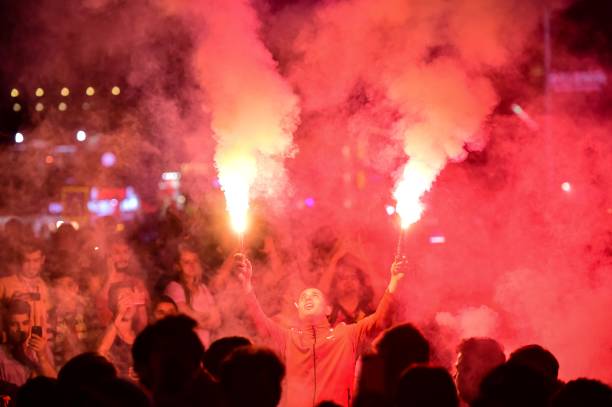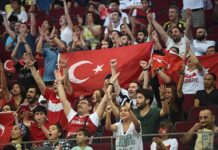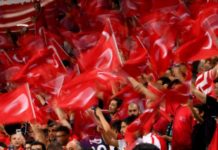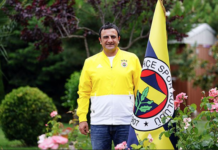
Vladimir Petkovic believes the opening game against Wales is key for a side hampered by injuries and a lack of match fitness
This article is part of the Guardian’s Euro 2020 Experts’ Network, a cooperation between some of the best media organisations from the 24 countries who qualified. theguardian.com is running previews from two countries each day in the run-up to the tournament kicking off on 11 June.
This is Vladimir Petkovic’s third major tournament as Switzerland coach, having guided the team to the last 16 at both Euro 2016 and the World Cup in Russia two years later. There are hopes that the Swiss can go a few steps further this time but there are uncertainties in defence, where Fabian Schär has been out injured for a large part of the season. He returned in May for Newcastle only to be sent off and hit by a three-match ban.
The centre-back says he is “fit and really looking forward to the European Championship” and Petkovic will hope he is right. The coach also has some problems on the left side, losing the Wolfsburg winger Renato Steffen to an ankle injury in May. There are options in the form of Steven Zuber and Ruben Vargas but they have spent large parts of their seasons on the bench at Eintracht Frankfurt and Augsburg respectively.
Xherdan Shaqiri is another player who has not played as much as Petkovic would have liked, but the Liverpool schemer is expected to start behind the attack as a No 10 and is normally capable of turning on the style despite a lack of match practice. Another Premier League player, Granit Xhaka, has had no shortage of games over a long season at Arsenal but has been playing out of position at left-back at times.
Petkovic is still confident before the tournament. “I have been watching videos of our opponents since March,” he told Blick. “I think it is positive that the tournament is played in different countries so that everyone isn’t together. We will offer our players a jab before the tournament but they will be in single rooms and no visitors from family – Uefa has banned that.”
The coach has pinpointed the first Group A game against Wales as key and says his team will be “120% ready” for the encounter in Baku. Petkovic prefers to play in a 3-4-1-2 formation that becomes 5-2-1-2 in defence, meaning that the wide players operate as wing-backs.
The coach
Born in Sarajevo, Petkovic came to Switzerland as a 24-year-old law student. After a fairly undistinguished playing career in the Swiss second tier he started his coaching career at AC Bellinzona in 1997 while working full-time as a social worker for a charity, Caritas Tessin. “I was working with unemployed people and some of them had drug and alcohol problems,” he told Blick last year. “I helped them to be able to handle everyday things and to find work. That, as is football, was also about people and motivation. I learned that every human being has their own personality and their own problems. But we tried to work as a team there and help each other to get to our goal.”
Icon
Xherdan Shaqiri. Magic dwarf, Alpine Messi, Power Cube – the diminutive left-footer has numerous nicknames, but Shaq Attack is the absolute No 1, especially among younger fans. He chose to wear No 23 because of Michael Jordan and is, by some distance, the most famous player in Switzerland despite the fact that he has played less and less for Liverpool . Has featured in many adverts, including for Volkswagen, Coca-Cola and supermarket chain Coop. In the summer of 2020 he had a hair transplant, using the same German specialist as Jürgen Klopp).
Thankful for a year’s delay
Borussia Mönchengladbach defensive midfielder Denis Zakaria suffered a bad knee injury against Dortmund in March 2020, in a duel with compatriot Roman Bürki. Zakaria had to undergo two operations and did not make his comeback until the end of November 2020. Had the Euros taken place last year, Petkovic would have had to do without him. “The [Gladbach] coach, Marco Rose, really supported me,” he says, “when you are struggling with an injury it is important to hear that the coach thinks you are still an important player.”
What the fans sing
The fan song Chum, Bring en Hei from 2006 is still a favourite. Written by Baschi, the Basel musician who is engaged to Alana Netzer, the daughter of Günter Netzer, once of Real Madrid and Gladbach. One line is: “Nume no en blinde Schiri chan eus no stoppa.” (Only a blind referee can stop us now). For Euro 2008 in Switzerland, the reference to “referee, I know where your car is” was dropped after pressure from Uefa.
What the fans say
“Oh, Embolo, oh Embolo, i dä Schwiizer Nati isch de Breel dihei!” – Oh Embolo, oh Embolo, his home is the Swiss national team!
“Zum Glück hommer no dä Sommer!” – Luckily we still have Sommer!
“Shaq, dä Schnägg” – Shaqiri, the snail
Pandemic hero/villain
In a 2020 Christmas video, the national stars came together to record a video for coronavirus victims. Goalkeeper Yann Sommer was one of those who took part, talking to a nurse at the Thusis GR hospital, and said afterwards: “This matter-of-factness, how she masters her everyday life as a nurse without fuss, even in Covid times, was impressive.”
Max Kern writes for blick.ch.
Follow him on Twitter @MaxKern3.
For a profile of Breel Embolo click here.












